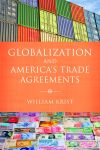guest post by William Krist
The United States is engaged in two huge trade negotiations that can have a far-reaching impact on our economy—and indeed the global economy. If successful, these negotiations may have a far greater impact than the North American Free Trade Agreement, which generated so much controversy in the early 1990s when it was being implemented. Unfortunately, the implications of the two agreements now under negotiation are not being addressed to a significant extent in the media, and the general public is far too uninformed about their potential impact.
One of these negotiations—the Trans-Pacific Partnership (TPP)—involves eleven other countries, including Japan, which has an economy some 40 percent the size of the United States. Other participants include some smaller but very important countries, like Vietnam and Malaysia. The other negotiation, known as the Trans-Atlantic Trade and Investment Partnership (TTIP), is with the European Union, whose 28 member countries account for roughly 20 percent of all world trade.
The objective of both negotiations is to eliminate all barriers to trade between the United States and our trade partners. In addition to tariffs on manufactured goods and agriculture, the agreements would remove some barriers to trade in services, provide proposed additional protections for foreign investors, and expand protection for intellectual property, including areas such as pharmaceuticals and copyrights. Perhaps of greatest significance, negotiators are also trying to better harmonize regulations for a number of products, including medical devices, chemicals, pesticides, and automobiles.
The United States joined the negotiations to establish the Trans-Pacific Partnership in 2009, and now the negotiations are very far along; in fact, negotiators hope to largely wrap them up at a Ministerial meeting in Singapore that will take place between December 7 and 9. While most observers believe this deadline will slip, many decisions will nonetheless be made in Singapore that will shape the final outcome. The negotiations with the European Union, which were launched earlier this year, are not as far along: the third round will take place December from 16 to 20 in Washington, D.C.
Supporters of these negotiations argue they will give a significant boost to our economy and the economies of our trade partners. For example, an economic model run by the Petersen Institute of International Trade in June 2012, before Japan, Canada and Mexico joined the negotiations, projected economic gains of $78 billion to the U.S. if the TPP negotiations are successful. And the economic benefits of a successful Trans-Atlantic Trade and Investment Partnership are expected to be even greater. The Business Coalition for Transatlantic Trade projects that the U.S. and EU economies will be some $250 billion richer in five years with a successful agreement, and that our economies would employ an additional 500,000 workers.
Apart from their commercial impact, these negotiations have important foreign policy implications. Just forty years ago, we were at war in Vietnam; today, Vietnam is an important trade partner which is seeking to reduce government control of its economy and become more market based. If the TPP negotiations are successful, other major countries such as China and India may join at a later date, and would have to adhere to the higher standard of rules developed in the TPP. Most importantly, boosting economic growth in our close allies, the European Union and Japan, which have both experienced very sluggish growth in recent years, is very much in our long-term national interest.
However, there are many extremely important concerns about what may be in these agreements. Unfortunately, both negotiations are largely being conducted behind closed doors without public discussion of the implications, and so it is hard to judge if the concerns are valid. Even Congress is complaining about the secrecy surrounding the negotiations. In a June 27, 2012 letter to the United States Trade Representative, 130 members of Congress requested greater transparency in the TPP negotiations.
And 60 Senators wrote the Administration urging that the negotiations address currency manipulation, which acts as a subsidy for a country’s exports and a tariff on imports. Several countries participating in the TPP have a history of manipulating their currency to gain a trade advantage, including Malaysia, Singapore, and Japan. The U.S. automobile industry in particular is worried that unless the agreement deals with this issue, the U.S. economy will be hurt, not helped, by an agreement.
Labor is deeply concerned that the agreements may favor big companies at the expense of the American worker. The AFL-CIO notes that some of our TPP partners have inadequate protections of labor rights and want the agreement to require participants to adhere to the core International Labor Organization standards.
Other concerns revolve around access to medicines. A leaked text of the Intellectual Property chapter posted on Wikileaks suggests that the TPP agreement will make it harder for our developing country partners—and indeed for people in the developed countries— to purchase more affordable generic drugs by granting longer terms to patented pharmaceuticals.
Both the Trans-Pacific Partnership and the Trans-Atlantic Trade and Investment Partnership negotiations have enormous potential to promote our economic and foreign policy interests. Unfortunately, they also have enormous potential for harm. The tragedy is that the press is not doing a better job of explaining the issues to the public.
 William Krist is a senior policy scholar at the Woodrow Wilson International Center for Scholars and author of Globalization and America’s Trade Agreements, published by JHU Press. During his career he was an Assistant U.S. Trade Representative, a legislative assistant for both a congressman and a senator, and an advocate for the high-tech industry. Krist has a regular weekly blog on trade policy at http://americastradepolicy.com.
William Krist is a senior policy scholar at the Woodrow Wilson International Center for Scholars and author of Globalization and America’s Trade Agreements, published by JHU Press. During his career he was an Assistant U.S. Trade Representative, a legislative assistant for both a congressman and a senator, and an advocate for the high-tech industry. Krist has a regular weekly blog on trade policy at http://americastradepolicy.com.
